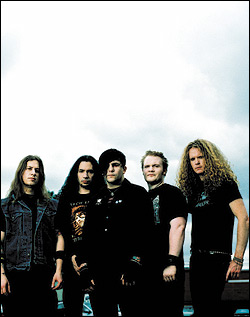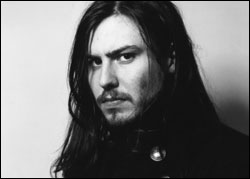Without a vocalist around to distract you via incoherent, misanthropic neuroses, instrumental metal often agreeably falls into the soundtrack-of-your-life realm. Hence, once you press play, you owe it to instrumental metal to do or imagine something adequately, y’know, filmic. You can do or imagine a lot of things while listening to Pelican, many of which don’t even require hallucinogens: Write a short-story anthology in an abandoned dive bar that you have no intention of publishing; pretend your last-legs Escort is transforming into the Batmobile as you peel down I-5 toward the skyline; visualize the Scanners-style pastel exploding heads of anybody who’s betrayed you. Hell, you can even refine your synchronized palm- muting/head-banging skills for the next annual Air Guitar World Championship that you won’t actually enter. It might be kind of weird to add “smile” to that list, but with the release of The Fire in Our Throats Will Beckon the Thaw (Hydra Head), smiles qualify, and they will be of the 35mm variety.
It wasn’t always like this. The depressive, driven doom crunch of Pelican’s debut Untitled EP and 2003’s Australasia could be directly traced to the stoic cavalry advances of Earth, Godflesh, Neurosis, and Isis. Their moniker certainly sounds docile, but if Pelican had taken, say, Mastodon first, nobody would’ve complained. Both records trampled you beneath galloping power riffs, then built a dense brick foundation right over your half-conscious, quivering body. Being buried alive had rarely been so (figuratively) breathtaking.
Still, unless you’ve read way too much Chuck Palahniuk, there’s nothing transcendent about getting the shit kicked out of you. The Chicago-based quartet realized this and imbued Fire with nuance, metaphorical weight, and acoustic melancholia. Aside from the careening bullet train outro to “Autumn Into Summer,” unadventurous metalheads will want for an annihilation that never comes. If trendy indie elitists can stomach Fire‘s innate (if tempered) aggression, Pelican’s audience may double, and Will Oldham could be photographing them bobbing out of a lake in no time. Everyone else can simply relax, let the songs do the heavy lifting, and let their imaginations run amok. Happily.
“A lot of heavy music makes people focus on negative emotions,” guitarist Trevor de Brauw says. “Somewhere in the course of writing Australasia, we became really interested in the idea of making heavy music that was more about feeling good. I think once we latched onto that, we kind of realized the artistic mission of the band and sort of where we wanted to go, soundwise. We’re definitely a lot closer ideologically to what we’re trying to do musically [on Fire] than we ever have been.”
Right now is a good time to clarify that Pelican are not exactly the Coral Reefers sans some old goof in a Hawaiian shirt crooning about margaritas. This is a slightly more thought-provoking breed of feel-good band. When de Brauw began hammering out Fire‘s slow-burn epics with co-guitarist Laurent Lebec, bassist Bryan Herweg, and drummer Larry Herweg (yup, they’re brothers), they frequently made adjustments for the sake of thematic continuity. It was initially easy to generate a superficial narrative—in an effort to avoid the punishing, unpredictable Windy City weather, de Brauw isolated himself on a North Carolina farm with his girlfriend. Voilà—seasonal tumult seemed like an obvious and winning metaphor, but as the album slowly came together, the band discovered a new underlying meaning behind its surprisingly optimistic sound.
“‘Red Ran Amber’ was a song that was written about the shift from autumn into winter,” de Brauw explains. “The song is supposed to signify the changing of the color of leaves and how it would be nice if we could reverse the process and go from winter into autumn; ‘Autumn Into Summer’ sort of suggests that shift, too. And what we ended up with was not necessarily an album about seasonal shifts—although in Chicago, yeah, the seasons can be pretty harsh—but, to a larger degree, [an album] about feeling out of control in a political climate or a cultural season that we don’t really feel like we’re a part of.
“That’s kind of the problem with the political left in this country. Everyone I had talked to prior to the [2004 presidential] election was already talking like they’d been beaten. And even when the election was over, nobody felt like there was any hope any more. And it’s fine to feel like that sometimes, but if you really want to effect change in your lives and the lives of people around you, you can’t sit around feeling sorry all the time. So yeah, that’s definitely an aim of the band, although I’d hesitate to say we have a political platform or anything like that. To the degree that the music is anthemic, it’s anthemic about trying to take charge over coercive forces in your life and make a change.”
Of course, if you’re not quite prepared to dare to dream about an America independent of a Bush regime, you can go lowbrow and play a far more popular Pelican what-if game; the lads are constantly beaten down with the “If you did record with a vocalist, who would it be?” question. Despite the obvious suitability of a barking Justin Broadrick disciple, everyone in the band has revealed a surprising affection for über-melodic moptop Ken Andrews, formerly of defunct space-pop heroes Failure. Everyone, that is, but de Brauw.
“Oh, we would never have Ken Andrews sing!” he faux blanches, pausing with spot-on comic timing. “It would be John Lydon. He would get really frustrated that we have song structures and stuff, I’m sure.”
Pelican play Neumo’s with Big Business, Red Sparowes, and Golgothian Sunrise at 7 p.m. Sun., Aug. 14. $10. All ages.







